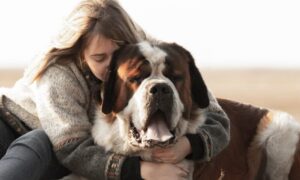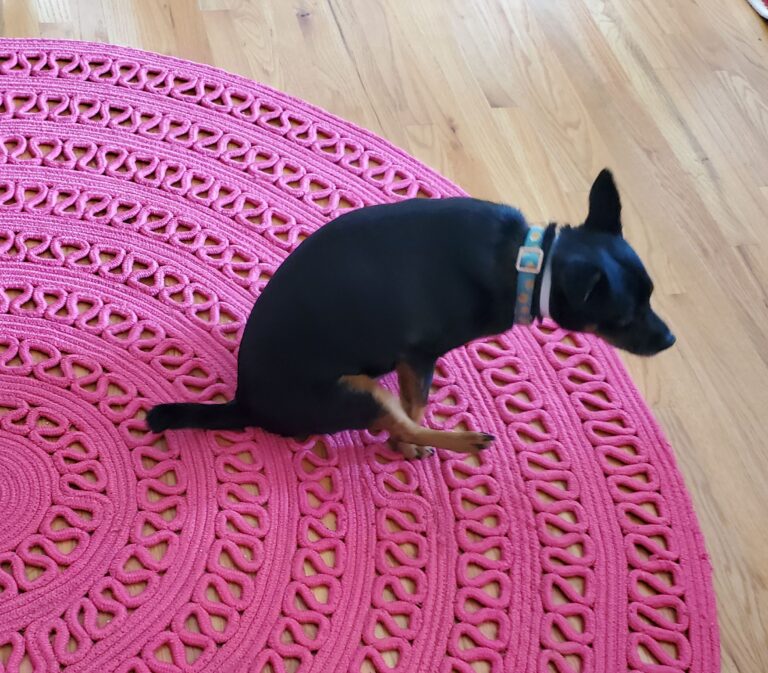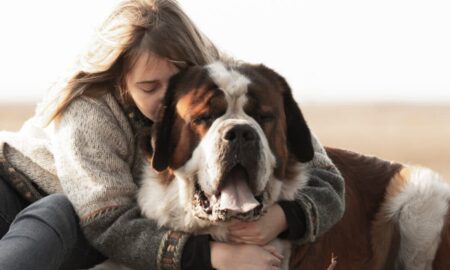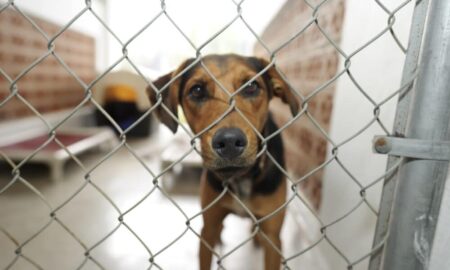We’ve all seen it: A canine sitting on the carpet and scooting his rump throughout the ground. Not solely is that this dangerous for the flooring — suppose micro organism, odor and perhaps even feces and blood left behind — it’s an issue in your pooch, too. Canine scooting signifies there’s an anal difficulty that wants addressing. Right here’s all it’s good to learn about why canine scoot and the perfect house treatments for canine scooting.
Why do canine scoot?
The most typical cause for canine scooting is from irritation round a canine’s rear finish. It could be an itch, ache or a extra major problem.
This may be something from anal gland points, parasitic infections, pores and skin infections across the rear or signs of allergic reactions, says Dr. Gavin Casper, a licensed holistic veterinarian at Hometown Animal Hospital in Weston, Florida.
Canine additionally will lick and chew at their anal space and scoot throughout the ground if there’s stool sticking to the perianal space or matted hair pulling on the world, says Dr. Judy Morgan, a licensed holistic veterinarian specializing in integrative drugs and proprietor of Naturally Wholesome Pets in New Jersey.
To successfully deal with your pup’s irritated bum and eradicate canine scooting, get to the foundation of the issue. A visit to the vet is the perfect place to start out. As soon as you realize the foundation trigger, you possibly can determine on the perfect course of remedy and get your canine some aid.
Are house treatments for canine scooting protected?
Dr. Casper doesn’t suggest house treatments for canine scooting initially as a result of they usually make issues worse or masks the signs. Nevertheless, when you’ve teamed up along with your vet to handle the foundation explanation for the canine scooting, there are some protected and efficient house treatments.
Root causes for canine scooting embody:
- Grooming sensitivities: Trimming your canine’s hair and cleansing his perianal space could also be all that’s wanted to alleviate irritation. Test for nicks or razor burn put up grooming in case that’s inflicting the irritation. Analysis grooming merchandise that gained’t irritate a delicate canine’s pores and skin.
- Allergic reactions: Allergic reactions might require some detective work to pinpoint the environmental (e.g. flea saliva, pollen and dirt mites) or meals irritant. After eliminating the irritant, it is best to discover indicators of aid in your canine’s habits. Your veterinarian is a good asset in find-the-allergen circumstances.
- Anal gland points: The highest wrongdoer for canine scooting from itchy bums is anal sac (or gland) points. On this case, Dr. Morgan says well-formed stools are the perfect protection. Agency stool places strain on the anal glands to assist them empty with the strain from the stool passing, she says.
What can I feed my canine to cease canine scooting?
For agency stools, specialists say feeding canine a high-quality weight loss program that accommodates a number of moisture and a few insoluble fiber works effectively. Including a excessive dose of fiber, equivalent to pumpkin puree for canine, coconut chips, floor pumpkin seed or psyllium husk, additionally will add bulk to the stool, Dr. Morgan says.
Canned pumpkin (pure pumpkin not pumpkin pie filling) is a really protected method to improve the digestible fiber in a canine’s weight loss program, which has been proven to assist with anal gland expression, and subsequently lower scooting behaviors, Dr. Casper says. You’ll find this within the grocery retailer or discover pumpkin puree created for canine in your native pet retailer, like Weruva’s Pumpkin Patch Up! or Fruitables’ Pumpkin SuperBlend Digestive Complement.
Does Metamucil for canine assist with canine scooting?
Metamucil is a fiber complement to assist people improve day by day fiber consumption. In a pinch, Metamucil for canine is a fiber-increasing choice to assist agency up canine stools for pure gland expression. Nevertheless, some Metamucil merchandise comprise added sugar whereas the sugar-free merchandise comprise aspartame, neither of which is sweet for canine. Communicate to your vet earlier than utilizing Metamucil for canine scooting to get the proper dosage in your canine, which depends upon his age, well being and weight.
Does Calendula assist with canine scooting?
For canine experiencing discomfort and swelling, heat compresses assist. One technique is a heat compress blended with a number of drops of calendula tincture.
Calendula has pure anti-inflammatory qualities, so the tincture blended with heat compresses ought to lower the discomfort, Dr. Casper says.
Different house treatments for canine scooting might provide anecdotal proof to lower scooting, however Dr. Casper says, “few have scientific research to show they work successfully and are protected.” These embody Myristica, Hepar Sulph and Silicea, which “are homeopathic treatments recognized to lower irritation related to the anal glands,” he says.
How do I do know if my canine’s anal sacs are inflicting the canine scooting?
Anal sacs, additionally known as glands, are two small pockets situated simply contained in the canine’s anus; one on both facet. These small sacs comprise an oily fluid with a particular odor or scent marker that canine use to speak with different animals, together with when careworn, afraid or pooping.
Wholesome anal glands empty naturally with the passage of stool. In the event that they turn out to be impacted, nevertheless, they might require handbook expression. Indicators of anal sac issues embody:
- Canine scooting
- Consistently licking and biting below the tail
- Foul, fishy odor from the rectal space
- Swollen or infected anus
- Straining, tough or painful bowel actions
- Blood or pus within the stool, across the rectum or the place he’s been resting
- Thick, brown or grey anal sac fluid
In case your canine has any of those signs, and particularly if he has a number of, head to the vet ASAP. Your veterinarian will aid you decide if the anal glands have to be expressed primarily based in your canine’s historical past and a bodily examination, Dr. Casper says. If anal glands should not expressed when wanted, it could possibly result in illnesses related to the anal glands that may be painful.
The most typical circumstances canine get from anal gland points are impaction and abscessation. In an impacted gland, it’s tough for the glands to precise so the contents harden which causes discomfort, Dr. Casper says. When anal glands turn out to be abscessed, a bacterial an infection results in pus or blood which will drain by the anal sac and may be seen on the pores and skin or hair across the anus, he continues.
Fortunately neither situation requires surgical procedure, specialists say.
Can I specific my canine’s anal glands at house?
Your canine’s anal sacs may be manually expressed by gently squeezing the fragile glands externally or internally. Some groomers embody exterior expression as a part of their service. They gently compress the skin of the sacs to push out the fluid.
Inner expression includes inserting a gloved, lubricated finger into the canine’s anus and gently squeezing every sac (finger inside and thumb exterior) to empty its contents. Most canine house owners let their veterinarians deal with anal gland expressions. Nevertheless, some intrepid canine house owners take this smelly, messy process on themselves. Ask your veterinarian to point out you the best way to do it correctly if you wish to tackle this problem. And, should you see blood or pus within the expressed fluid, your canine’s anal glands are contaminated, and he must see the vet.
When anal gland expression shouldn’t be performed at house
As a result of most canine by no means or not often want anal sac expression, and since veterinarians can establish particular issues with the glands or rectum when expressing them, specialists say it’s finest performed on the vet.
Rectal tears, bruising and trauma to the world may cause vital harm, Dr. Morgan says. And, she provides, anal glands shouldn’t be expressed simply because the canine is being groomed. They need to solely be expressed if there’s a medical want, equivalent to impaction or abscess.
In case your canine doesn’t reply to house treatments for canine scooting, weight loss program modifications, anal gland expression or mixed therapies, and signs persist, your veterinarian may suggest anal sac elimination, or anal sacculectomy. On this surgical procedure, one or each of the anal sacs are eliminated, as soon as an infection and irritation are resolved.
“Anal glands shouldn’t be eliminated until they’ve a tumor or have continual abscessation not resolved by weight loss program modifications,” Dr. Morgan says. “I eliminated lower than six in 38 years of follow” she provides.
Canine scooting is disagreeable in your pooch and for you. Nevertheless, armed with figuring out what could possibly be inflicting your canine’s discomfort, house treatments for canine scooting, and your vet’s recommendation, you possibly can eradicate the unpleasantness, forestall severe points and supply lasting aid.







